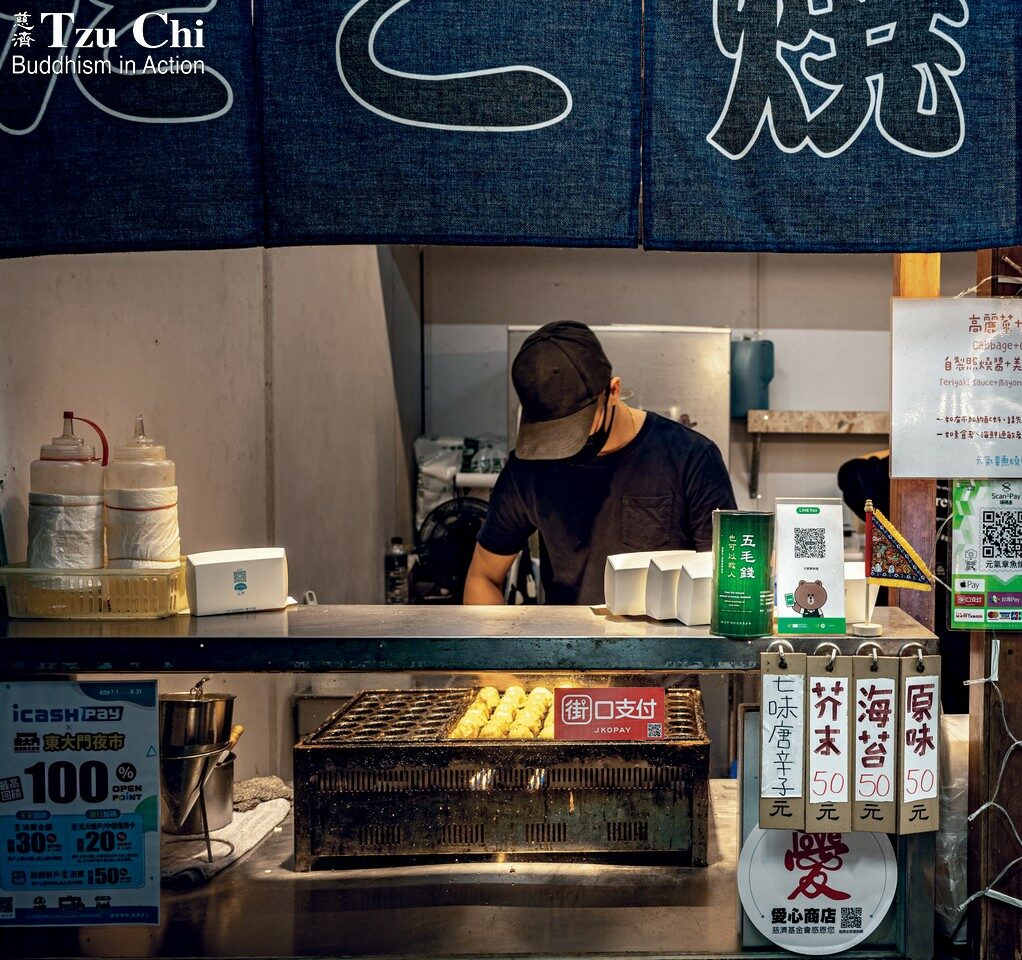By Yeh Tzu-hao
Translated by Wu Hsiao-ting
Graphic by Xu Shu-zhen
Photos by Hsiao Yiu-hwa

It could be a grocery store, clothing shop, pharmacy, or even a hospital, but they all have one thing in common—they’ve joined the ranks of Loving Stores, in which Tzu Chi coin banks encourage kindness and donations of small change to help the needy.
In Taiwan, a rich array of physical stores and stalls lining the streets contributes to the convenience of people’s lives. Shop owners and their staff, often working long hours, constitute one of the most industrious groups on the island. While busy making a living, over 20,000 vendors and shop proprietors across Taiwan have joined Tzu Chi’s Loving Store campaign. They’ve agreed to place a coin bank on their counters, providing customers with an opportunity to donate their spare change for charitable purposes.
For this campaign, volunteers visit business establishments to enlist participants and return to collect donations. On this day, a small group of volunteers arrived at one of the participating businesses, a restaurant in Luzhou, New Taipei City, northern Taiwan. The manager, Ms. Jiang, welcomed the familiar faces and engaged in friendly conversation with them. The topic soon turned to the difficult times during the COVID-19 pandemic. “Large banquets were prohibited during the pandemic,” Jiang said. “Only five or six people were allowed at each big table, and even then we needed partitions. We truly experienced three tough years.” The manager had seen many larger businesses close due to the pandemic, but fortunately, her restaurant persevered until the situation improved and customers returned. But now they faced another challenge: maintaining service quality amidst labor shortages. Running a restaurant is surely no easy task.
“It was really something to survive those three years,” remarked volunteer Su Min-hui (蘇敏惠). “Your restaurant became one of the oldest in Luzhou after sailing through the pandemic’s challenges.” Su thanked Ms. Jiang for her commitment to social good by participating in the Loving Store campaign, despite the difficulties faced in operating a restaurant. She also recommended the restaurant’s delicious vegetarian meals to her fellow volunteers.
Moving on, the group made its way to a maternal and child clinic. They arrived to find the waiting area buzzing with mothers and babies, and the director, medical staff, and administrative personnel busily attending to their duties. Ms. Zheng, a nurse representing the clinic, joined the Tzu Chi volunteers to count the donations from the coin bank placed in the clinic.
“This coin bank was made from recycled plastic bottles,” volunteer Su said. Nurse Zheng expressed surprise as she learned that the latest version of the Tzu Chi coin bank, semi-transparent and green, was made from 12 PET bottles. Working together, they tallied the amount accumulated in the coin bank over the month, totaling more than 800 New Taiwan dollars (US$25). In a heartwarming gesture, the nurse contributed a 1,000 NT dollar bill from her own pocket, boosting the total amount to a four-digit figure, pleasantly surprising everyone around. The total donated amount was then recorded, and both parties signed off as witnesses.
Next, the volunteers visited an animal hospital. Dr. Yang, who oversees the hospital, warmly greeted the visitors. After the donations from the coin bank hosted by the hospital were tallied, volunteer Huang Fang-ling (黃芳菱) took out a copy of Tzu Chi Monthly, sharing updates on Tzu Chi with the veterinarian. When she reached the page with Tzu Chi’s global contact directory, she said to Dr. Yang, “If you ever require assistance abroad, you can find help here, provided there are Tzu Chi volunteers in that region.”
Dr. Yang is from Kinmen, one of Taiwan’s outlying islands, where his grandmother also takes part in Tzu Chi activities. He readily agreed to join the Loving Store campaign when invited due in part to this connection. Not only did he agree, but he also promptly donated thousands of NT dollars, kick-starting his establishment’s contributions to the campaign.

A food stall at a night market in Hualien, eastern Taiwan, hosts a Tzu Chi coin bank on its counter, encouraging people to donate for philanthropic purposes.
The Tzu Chi Loving Store Campaign
The campaign was launched in 2019 in Hualien, eastern Taiwan. Businesses participate by placing a Tzu Chi coin bank in their store to collect donations. When it’s time to be emptied, volunteers and store representatives open it together. They count and record the amount collected, then sign off as witnesses. Volunteers next mark the date on a new seal tag and reseal the bank. Thus begins the next round of fundraising. Donations collected are placed into a designated collection bag and returned to the local Tzu Chi office. The financial team deposits them into a specified account and issues receipts. Volunteers deliver these receipts to the participating businesses on their next visit. As of March 13, 2024, 20,020 businesses had joined the campaign.
The shops that have joined the ranks of Tzu Chi Loving Stores come in all varieties. Despite the diversity, what matters most is a compassionate heart to participate. Since the campaign was launched five years ago, the donation collection coin bank has undergone several improvements. The latest version, made from 12 recycled PET bottles and featuring a translucent jade green hue, is gradually replacing the earlier metal version (see photo 1).
Expansion
The Loving Store campaign, once started, soon expanded to various towns and villages in Hualien, with approximately 600 businesses joining within a year. However, progress slowed due to the COVID-19 pandemic. It wasn’t until mid-2022, when conditions improved, that the initiative started to reach other areas in Taiwan, such as Taipei, Taoyuan, Hsinchu, Changhua, and Kaohsiung, where local Tzu Chi volunteers joined efforts to promote it.
Lin Shu-zhen (林淑真), residing in Shilin, Taipei City, recalled her first attempt, in July 2022, to garner support for the campaign. Initially intending to visit a shop belonging to a Tzu Chi donating member (people who contribute monthly donations to the foundation), she inadvertently veered onto a different path after leaving home. She found herself standing in front of a vegetarian restaurant when she finally realized her mistake. Embracing the serendipitous moment, she entered and explained the purpose of her visit to the owner. The owner resonated with the campaign and allowed her to place a coin bank in the restaurant. It wasn’t until later that Lin met with the original shop owner she had intended to visit and discovered that she was actually out of town that day.
“I believe there were bodhisattvas guiding me that day, don’t you think?” said Lin. “Despite taking the wrong path, I successfully enlisted my first store.” This fortuitous encounter led that popular vegetarian restaurant to become the first Loving Store in the greater Taipei area.
It was easier to enlist business owners who were already Tzu Chi donating members or supported Tzu Chi’s causes, but volunteers sometimes encountered those who were less familiar with the foundation. When that happened, they had to put in extra effort to explain and convince them to join. There were also testing situations.
Volunteer Gao Xiu-min (高秀敏) once entered a shoe store to invite them to join, only to receive a cold response from the owner: “You can place a coin bank here, but it is none of my concern if no one donates.” Gao noticed other organizations’ collection boxes already on a desk. They were covered in dust, with hardly any coins collected.
In response, Gao explained to the store owner that the purpose of a Tzu Chi coin bank was not just to solicit concrete donations but also to inspire kindness. “You can start every workday with a kind thought and deposit it in the coin bank—it’s like wishing yourself the best,” she said with a smile.
When Gao visited the store again on her return journey, the owner cheerfully greeted her, saying, “Sister, we got our very first donation!” It turned out a customer had negotiated the price, and the owner suggested: “My prices are fair. How about this? How about you perform a good deed by putting the money I didn’t earn into that coin bank for charitable purposes?” The customer agreed, much to his delight.
While a monetary donation is cause for celebration for volunteers involved in the campaign, inspiring kind thoughts in both shop owners and customers is even more important.
A caring community network
Store or stall owners face numerous challenges in managing their businesses, including attracting and retaining customers, maintaining competitive pricing, adapting to market trends, and finding reliable staff. Additionally, they may find themselves tethered to their establishments without much freedom. Volunteer Su Min-hui, who once managed a stall, understands the hard work involved. When she was younger, she and her husband rented a stall in a mall near Taipei Station selling toys. They worked long hours, from 10 a.m. to 10 p.m. every day. “Store owners are often tied up with their work,” she noted. “Having a coin bank in their stores allows them to contribute to charitable causes and sow blessings without needing to leave their premises.”
Ouyang Gui-ying (歐陽貴英), who serves as the liaison for the Loving Store endeavor in Luzhou, expressed gratitude to participating store owners: “They provide space for our coin banks without us having to pay rent, creating opportunities for everyone to do good. Where else can you find such a wonderful thing? We must embrace these opportunities to do good together.”
There is a great variety of businesses that have joined and volunteers have encountered shop owners from all kinds of backgrounds in promoting the campaign. In the process, they have found a common desire among people to do good.
For instance, Mr. Zou, who operates an eyeglasses store, informed volunteer Su Min-hui of their trade union’s plan to donate reading glasses to needy individuals and asked if Tzu Chi could assist. “Yes, certainly,” Su responded.
More than 20,000 stores, stalls, and other businesses have joined the campaign since its inception, reflecting the kindness of the Taiwanese people. The primary focus of this campaign isn’t about the amount of money raised but about nurturing goodwill and connecting stores into a caring community network. Tzu Chi welcomes all store owners to join and participate in this meaningful endeavor, through which every contribution, no matter how small, plays a role in fostering a culture of kindness and generosity.



